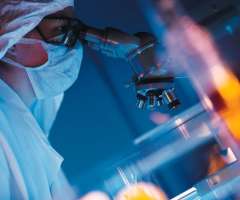Do You Know Your Tumor’s Genes?
Spring 2017

Brain cancer is a devastating disease—even more so because it can occur at younger ages than cancer in the rest of the body and because it has been resistant to traditional cancer therapies. Many people have experienced the suffering and loss of a family member, loved one or friend to brain cancer. UCLA provides comprehensive brain cancer care and deploys leading-edge therapies for this disease, including a range of clinical trials. An important goal in brain cancer is to develop tailored therapy for the genetics of each person’s tumor. Research to discover new therapies that are more effective against brain cancer indicates that each patient’s brain cancer has different DNA mutations that dramatically affect its cancer. For example, some of these gene mutations enable the cancer to grow more quickly, evade chemotherapy, and extend throughout the brain. These mutations also make the cancer dependent on certain molecules.
UCLA neurology researchers are working to identify specific mutations in brain cancer genes by sequencing the brain cancer genome, which will enable them to tailor therapies for each patient’s condition and more effectively treat the cancer. One such mutated gene is IDH1, which is particularly common in brain cancer in younger adults. IDH1 mutations produce high levels of a molecule that appears to initiate activity wherein normal brain cells develop into cancer cells. Interestingly, this molecule may also serve as an indicator for the tumor, allowing an MRI to detect it at earlier stages.
Drs. Albert Lai and Timothy Cloughesy, along with a team of researchers at UCLA, are studying patient brain cancers, preclinical models of brain cancer in the lab, and novel drugs in clinical trials to determine how IDH1 mutations allow cancer cells to grow and how these mutations combine with other gene mutations in the cancer to provide for a “cancer escape” from chemotherapy. Research into IDH1 and other brain cancer gene mutations will identify unique vulnerabilities in the tumor.